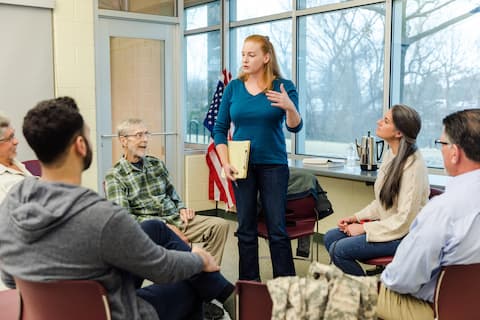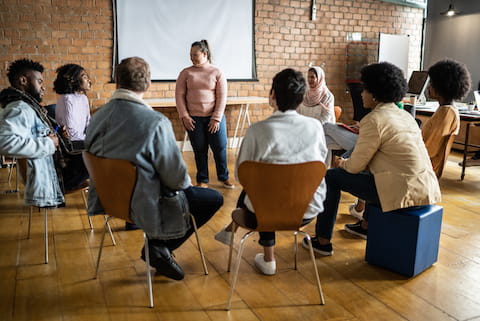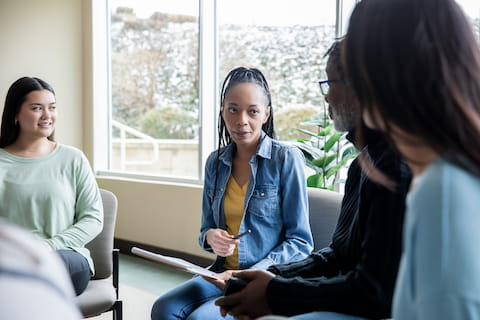What is Caregiver Education?

Overview
The Caregiver Education learning collaborative utilizes the NCTSN Resource Parent Curriculum (officially titled Caring for Children Who Have Experienced Trauma: A Workshop for Resource Parents). It is an eight-module workshop designed to educate caregivers (biological or adoptive parents, foster parents or relatives) on the effects of trauma on the children in their care. The workshop is led by a clinical facilitator and a parent facilitator with lived experience raising a child who has been exposed to trauma.
The Caregiver Education learning collaborative is designed as a “Train the Facilitator” training. The series is provided to parents and master’s level professionals identified by their CMHSP and their provider agencies to become facilitators of the NCTSN’s psychoeducational curriculum for caregivers raising Children who have experienced trauma. Parent Facilitators have raised a child who has experienced trauma and whose position within CMHSP or provider agency is based upon their parental role. Clinical Facilitators are master’s level clinicians working with children and families.
Caregiver Education Modules
The Caregiver Education curriculum consists of 8 modules formatted to be presented in 6-8 consecutive sessions of up to two hours each to caregivers raising children who have experienced trauma. The Caregiver Education group is designed to be conducted by a team of two facilitators, a clinical facilitator and a parent facilitator.

The 8 Caregiver Education modules are:
- Module 1: Introductions
- Module 2: Trauma 101
- Module 3: Understanding Trauma’s Effects
- Module 4: Building a Safe Place
- Module 5: Dealing with Feelings & Behaviors
- Module 6: Connections and Healing
- Module 7: Becoming an Advocate
- Module 8: Taking Care of Yourself
Who can benefit from Caregiver Education?
Caregivers participating in the group include anyone who cares for a child who has experienced trauma and this can include biological parents, kinship caregivers, adoptive parents, and guardians and can all benefit from the curriculum.
The overall goals of facilitating the caregiver education groups are:
- Improve participants’ understanding of the effects of trauma on the children in their care.
- Transfer information and skills that will help caregivers to effectively care for children who have experienced trauma.
- Encourage retention and ongoing use of the material.
The first and most basic element of trauma-informed parenting is to recognize the impact trauma has had on your child’s life. When we view children’s challenging behaviors through the “lens” of their traumatic experiences, that behavior begins to make more sense. When resource parents, caseworkers, and other members of the child’s team share this lens, they can develop effective strategies together.
What does a Caregiver Education Learning Collaborative Training look like?

A Caregiver Education Learning Collaborative training through the Children’s Trauma Initiative consists of:
- A 13-month commitment
-
Two learning sessions approximately 3 months apart.
- Learning Session 1 is 2 days
- Learning Session 2 is 1 day
- Participation in monthly consultation calls for 12 months
- Implement at least one group with caregivers during the Learning Collaborative
- Pre and Post group data collection through our REDCap data collection system
-
Teams consist of at least 1 clinical facilitator, 1 parent facilitator and a team supervisor
- Team Supervisors currently provide clinical supervision to master’s level therapists
- Clinical facilitators are serving children, youth, and their families who are part of the Community Mental Health Services Programs (CMHSP) system
- Parent Facilitators have raised a child who has experienced trauma and are in a position within a CMHSP or provider agency that is based upon their parental role
For additional information about Caregiver Education, please visit the Resource Parent Curriculum Online.
Training Qualifications
Caregiver Education Learning Collaboratives are provided on a regular basis throughout the year to Community Mental Health Services Programs (CMHSPs) and their provider agencies. To qualify for a Learning Collaborative in our Caregiver Education program, you must be either:
- Clinical Facilitators must be licensed clinicians employed by either a CMHSP or Provider Agency.
- Parent Facilitators are caregivers who have lived experience raising a child who has experienced trauma and are employed by either a CMHSP or Provider Agency.
Please speak with your agency supervisor if you are interested in participating in an upcoming Learning Collaborative.
